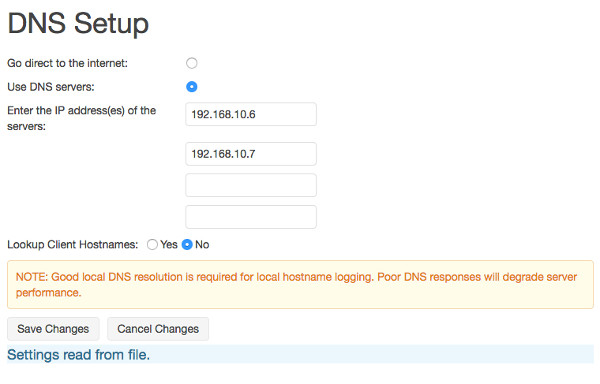DNS Setup

Go direct to the Internet
In rare cases you may not have access to any DNS servers: if this is the case select this option. When selected DNS lookups will go direct to the 'root' servers. This is, however, the least efficient method and may also incur a performance penalty.
Set up DNS servers
- click on the
Use DNS serversradio button - enter the list of DNS servers you use
- click
Save Changes.
IMPORTANT: In most cases the DNS servers set here should be ISP, RBC, Local Authority, or other externally managed servers. DNS servers on the local network may be used but as only sites outside your local network should be filtered it is more efficient and robust to use an external DNS service. There is also a potentially severe performance penalty in using local DNS as it can put excessive load on the local network and server NICs.
If you have a particular reason to filter web sites which you host internally then you will need to have local DNS servers set here so that the filter/cache can resolve their hostnames but this is rarely required as you should, of course, be able to trust your own content!
Lookup Client Hostnames
If you are using local DNS servers you may use them to lookup and log your clients' hostnames. If you choose this option then please read the warning in the interface and the note above. Using reverse DNS lookup adds an extra load on the Protex server, your DNS server and the network and may lead to a degradation in performance. Only use this option if you are confident that your DNS setup will repond quickly and accurately to the reverse lookup requests.
NOTE: browsers should be configured so that NO local servers are sent via the cache as (a) it adds unnecessary load to the cache server and (b) why would you want to filter your own content? The 'Do not proxy for' setting should include the local network, localhost, the cache server's IP address and its Fully Qualified Domain Name.